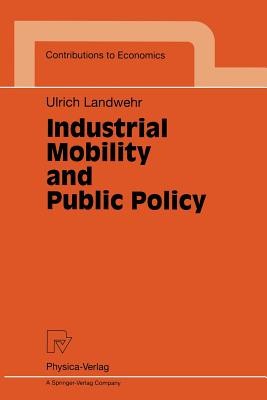
- We will send in 10–14 business days.
- Author: Ulrich Landwehr
- Publisher: Physica Verlag
- Year: 1996
- Pages: 169
- ISBN-10: 3790809497
- ISBN-13: 9783790809497
- Format: 15.6 x 23.4 x 1 cm, minkšti viršeliai
- Language: English
- SAVE -10% with code: EXTRA
Reviews
Description
The widespread debate on industrial mobility and on the consequences of industrial mobility for the income of local resources has motivated me to look closer at some immanent questions concerning optimal public policy. I think that regarding locations as endowed with some stock of local resources (especially local labour) and regarding local policy makers as interested in a high income of local resources is a quite realistic approach to the issue of rent-shifting public policy in view of industrial mobility. My attention has been especially drawn to the role of inter-industry mobility differentials for public policy. As soon as the discussion focuses on local resources, it becomes clear that the expansion of a mobile industry at some location will absorb local resources which may come from local immobile industries and that the contraction of a mobile industry will release local resources which may go to local illliIlobile industries. The present study is my dissertation for a doctorate in economics at the Universitat Mannheim. It evolved at the Universitat Mannheim, where I have been member of the Graduiertenkolleg Finanz- und Gutermarkte since October 1993, and at the University College London, where I stayed as a participant in the European Network for Training in Economic Research (ENTER) from November 1994 to April 1995. The implicit support by the Deutsche F orschungsgemeinschaft and the ERASMUS programme is gratefully acknowledged.
EXTRA 10 % discount with code: EXTRA
The promotion ends in 21d.23:53:22
The discount code is valid when purchasing from 10 €. Discounts do not stack.
- Author: Ulrich Landwehr
- Publisher: Physica Verlag
- Year: 1996
- Pages: 169
- ISBN-10: 3790809497
- ISBN-13: 9783790809497
- Format: 15.6 x 23.4 x 1 cm, minkšti viršeliai
- Language: English English
The widespread debate on industrial mobility and on the consequences of industrial mobility for the income of local resources has motivated me to look closer at some immanent questions concerning optimal public policy. I think that regarding locations as endowed with some stock of local resources (especially local labour) and regarding local policy makers as interested in a high income of local resources is a quite realistic approach to the issue of rent-shifting public policy in view of industrial mobility. My attention has been especially drawn to the role of inter-industry mobility differentials for public policy. As soon as the discussion focuses on local resources, it becomes clear that the expansion of a mobile industry at some location will absorb local resources which may come from local immobile industries and that the contraction of a mobile industry will release local resources which may go to local illliIlobile industries. The present study is my dissertation for a doctorate in economics at the Universitat Mannheim. It evolved at the Universitat Mannheim, where I have been member of the Graduiertenkolleg Finanz- und Gutermarkte since October 1993, and at the University College London, where I stayed as a participant in the European Network for Training in Economic Research (ENTER) from November 1994 to April 1995. The implicit support by the Deutsche F orschungsgemeinschaft and the ERASMUS programme is gratefully acknowledged.


Reviews